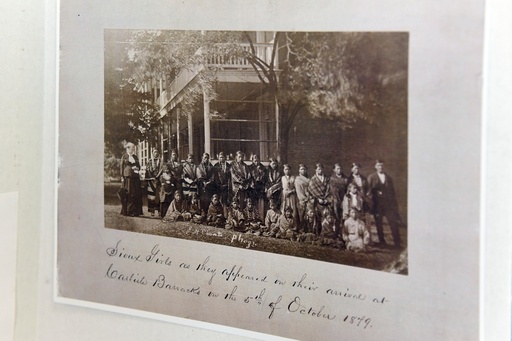
LAVEEN VILLAGE, Ariz. — President Joe Biden made history on Friday by offering an apology for the enduring and systemic abuse that Indigenous children faced in federally-run boarding schools. This acknowledgment marked a significant moment, as no sitting U.S. president has previously taken such a step.
For a span of 150 years, the U.S. government took Indigenous children from their families and placed them in boarding schools designed to erase their cultures, languages, and identities. These children often faced harsh punishments for speaking their native languages. “We should be ashamed,” Biden stated to an audience of Indigenous individuals at the Gila River Indian Community near Phoenix, which included tribal leaders, survivors, and their families. He characterized the boarding school system, initiated in 1819, as “one of the most horrific chapters in American history,” recognizing the extensive abuse that many children suffered and the lasting trauma left in its wake.
Many Native Americans have expressed relief at this long-awaited apology, viewing it as a necessary recognition of the government’s role in these historical injustices. However, they emphasize that apologies must lead to tangible actions. Bill Hall, 71, from Seattle, recalled being taken from his Tlingit community in Alaska at the age of 9 to attend a boarding school where he suffered years of abuse that lingered into his adult life. Initially skeptical about the sincerity of the apology, Hall found himself overcome with emotion as he listened to Biden. “Yes, I accept his apology. Now, what can we do next?” he asked.
Rosalie Whirlwind Soldier, a 79-year-old member of the Rosebud Sioux Tribe, also shared her feelings about the apology, expressing that it brought a “tingle” to her heart; yet, she lamented the deep scars that remain. Having suffered from severe mistreatment at a South Dakota boarding school that sought to strip her of her Lakota identity, she pointed out, “Sorry is not enough. Nothing is enough when you damage a human being.” She described how the trauma inflicted not only affected her but devastated an entire generation.
According to an investigation by the Interior Department, led by the first Native American Secretary Deb Haaland, the boarding schools aimed to assimilate Native American, Alaska Native, and Native Hawaiian children while dispossessing their tribes of land. In her introduction of Biden, Haaland acknowledged the apology as a critical recognition of a dark period in American history, while also celebrating Indigenous resilience: “Despite everything that happened, we are still here.” The investigation, commissioned by Haaland in 2021, reported on over 18,000 Indigenous children, revealing that at least 973 lost their lives in these institutions, though estimates suggest the actual number could be much higher.
The report offered several suggestions based on survivor testimonies, including essential resources for mental health support and initiatives for cultural language revitalization. Gila River Indian Community Governor Stephen Roe Lewis highlighted that Biden has committed to implementing these recommendations. “This lays the framework to address the boarding school policies of the past,” he remarked.
Benjamin Mallott, president of the Alaska Federation of Natives, emphasized the importance of meaningful actions following the apology, including efforts to revive Indigenous languages and cultures, as well as the return of Native children who remain unaccounted for. Victoria Kitcheyan, chairwoman of the Winnebago Tribe of Nebraska, echoed this sentiment, asserting that true healing cannot begin until tribes can repatriate their children’s remains.
Haaland confirmed the Interior Department’s commitment to repatriating the remains of children buried at boarding schools. In addition, Democratic U.S. Senator Elizabeth Warren called the president’s apology a significant step toward accountability for the historical injustices inflicted on Native children and their communities. Republican Senator Lisa Murkowski of Alaska similarly praised Biden’s comments while emphasizing the need for a comprehensive truth and healing commission to take shape.
As Biden concluded his remarks, many tribal members stood to acknowledge the moment, capturing it on their phones. Dressed in traditional attire, a few proudly donned shirts in support of Biden and Vice President Kamala Harris. Following a moment of silence and the formal apology, the atmosphere filled with applause and chants of “Thank you, Joe.”
Hall, who has fought for resources to help address the longstanding traumas, remains cautious about the future, expressing concern that healing will be a challenging endeavor unless the government fully commits to assisting tribal nations. “It took a lifetime to get here. It’s going to take a lifetime to get to the other side,” he remarked wistfully. “And that’s the very sad part of it. I won’t see it in my generation.”
